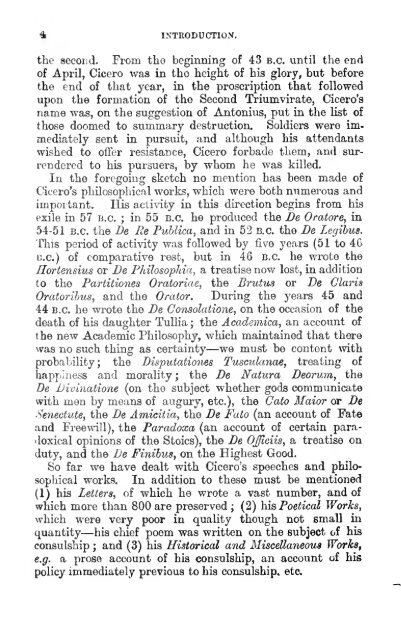Pro S. Roscio Amerino
Pro S. Roscio Amerino
Pro S. Roscio Amerino
You also want an ePaper? Increase the reach of your titles
YUMPU automatically turns print PDFs into web optimized ePapers that Google loves.
4 INTRODUCnON.<br />
the aecond. From the beginning of 43 b.o. until the end<br />
of April, Cicero was in the height of his glory, but before<br />
the end of that year, in the proscription that followed<br />
upon the formation of the Second Triumvirate, Cicero's<br />
name was, on the suggestion of Antonius, put in the hst of<br />
those doomed to summary destruction. Soldiers were immediately<br />
sent in pursuit, and althoiigh his attendants<br />
wished to ofFer resistance, Cicero forbade them, and surrendered<br />
to his pursuers, by whom he was killed.<br />
In the foregoing sketch no mention has been made of<br />
Cicero's philosophical works, which were both numerous and<br />
impoitant, His activity in this direction begins from his<br />
exile iu 57 b.c. ; in 55 b.c. he produced the De Oratore, in<br />
54-51 B.c. the Be Re Publica, and in 52 b.c. the De Legihus.<br />
This period of activity was followed by five years (51 to 46<br />
B.c.) of comparative rest, but in 46 b.c. he wrote the<br />
Hortensius or De Philosophia, a treatise now lost, in addition<br />
to the Partitiones Oratoriae, the Brutus or De Claris<br />
Oratoribus, and the Orator. During the years 45 and<br />
44 B.c. he wrote the De Consolatione, on the occasion of the<br />
death of his daughter Tullia; the Academica, an account of<br />
the new Academic Philosophy, which maintained that there<br />
was no such thing as certainty—we must be content with<br />
probability; the Disputationes Tuscidanae, treating of<br />
happiness and morality; the De Natura Deorum, the<br />
De Divinatione (on the subject whether gods communicate<br />
with men by means of augury, etc), the Cato Maior or De<br />
Senectute, the De Amicitia, the De Fato (an account of Fate<br />
and Freewill), the Paradoxa (an account of certain paradoxical<br />
opinions of the Stoics), the De Officiis, a treatise oa<br />
duty, and the De Finibus, on the Highest Good.<br />
So far we have dealt with Cicero's speeches and philosophical<br />
works. In addition to these must be mentioned<br />
(1) his Letters, of which he wrote a vast number, and of<br />
which more than 800 are preserved ; (2) hiaPoetical Works,<br />
which were very poor in quality though not small in<br />
quantity—his chief poem was written on the subject of his<br />
consulship ; and (3) his Historical and Miscellaneous Works,<br />
e.g. a prose account of his consulship, an account of his<br />
policy immediately previous to his consulship. etc.

















